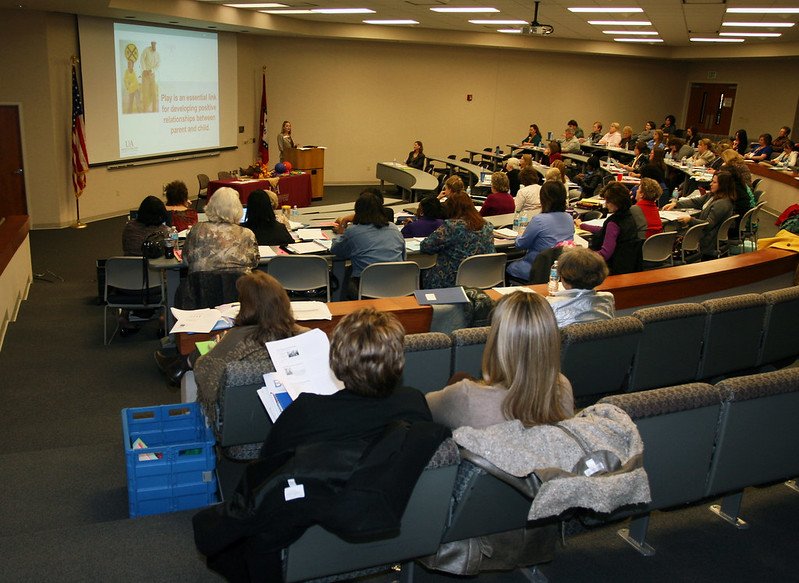By Rebekah Hall
U of A System Division of Agriculture
LITTLE ROCK — In 2024, the University of Arkansas System Division of Agriculture’s Best Care program awarded more than 22,000 hours of professional development to childcare providers in the state. Providers are required by the Arkansas Department of Education Office of Early Childhood to earn a minimum of 15 hours of professional development each year.
TRAINING FOR PROVIDERS — Through the Division of Agriculture's Best Care programming, childcare providers across the state of Arkansas can earn required hours of professional development training. (Division of Agriculture graphic.)
The Cooperative Extension Service, part of the Division of Agriculture, partners with the Arkansas Department of Education Office of Early Childhood to provide 58 hours of professional development training for childcare providers throughout the state.
“It is important that the childcare providers in Arkansas are educated and are knowledgeable in research-based early childhood practices to provide quality care to children, from birth to age five,” said Rebecca Simon, extension program associate for Early Childhood and Family Life for the Division of Agriculture.
Extension offers four methods of Best Care training, all of which are approved by the Arkansas Professional Development Registry, for childcare providers in the state:
Best Care: Ten hours of in-person training for childcare professionals across the state, taught in 26 multi-county clusters. In 2024, this program reached 2,373 participants through 32 trainings.
Best Care Connected: An online program that offers five hours of professional development for early childhood childcare educators in Arkansas. In 2024, this program reached 2,234 participants, and 11,170 hours of professional development were awarded.
Guiding Children Successfully: An online or self-paced correspondence program that offers up to 38 hours of continuing education for parents, foster parents and childcare educators. This program reached 998 participants and awarded 10,374 training hours in 2024.
Best Care Out of School Time: A program designed to better meet the needs of childcare providers who work with school-aged children in after-school, summer and camp settings. This program offers five hours of professional development, and in 2024, 557 training hours were awarded to 2,785 participants.
Simon said these four programs are tailored to the needs of childcare providers statewide, including those in remote and underserved areas. Extension Family and Consumer Sciences agents play a significant role in the delivery of the training.
“County Family and Consumer Sciences agents are responsible for planning and providing training in their ‘cluster,’ or multi-county setting,” Simon said. “The FCS agents build relationships within their community and are seen as the local source of knowledge, providing consistent, research-based professional development for local early childhood professionals.
“The training content is different every year, and that is one reason why early childhood professionals attend Best Care in their county or cluster every year,” Simon said. “The programs that the Division of Agriculture implements and provides strengthen the early childhood workforce and improve the lives of our youngest Arkansans.”
Simon said the extension training programs are aligned with Family and Consumer Sciences subject matter areas, including family life, health, nutrition and consumer economics. They also align with the Arkansas Department of Education Office of Early Childhood key content areas, including family, community, positive interactions and guidance.
“High quality early childhood environments are vital for fostering the foundational skills necessary for children’s lifelong health, learning, social relationships and overall success,” Simon said. “In Arkansas, childcare providers play a pivotal role in ensuring these developmental milestones are met.”
Simon said there are more than 48,600 professionals serving 165,219 children across 1,940 childcare facilities statewide.
Feedback from the field
In an evaluation sent to Best Care participants after each one-hour unit of training, one participant responded that the training helped them to “have conversations with children about our differences and find ways to include those physically impaired to do our usual curriculum.”
Another participant shared that the training helped them “implement breathing techniques when a child is stressed and struggling with strong emotions,” they wrote. “This helps us to get a handle on the situation, and as a result, it de-stresses me in the process.”
One participant said the program helped them “recognize the unique aspects of the children and their families to create a diverse learning environment that fosters a sense of well-being for all.”
The year ahead
Thirty Best Care trainings are scheduled throughout the state for 2025, in addition to online programming. Best Care lesson topics for the year will include Farm to Early Childhood Education, Sensory Play for All Ages, Outdoor Learning Environments and Physical Activity, Sound Solutions: Music in the Classroom, Arkansas History and Culture and more.
Those interested in Best Care training should contact their local Family and Consumer Sciences agent at uaex.uada.edu/counties/ for information about upcoming training in their area or visit uaex.uada.edu/life-skills-wellness/child-care-providers/best-care. More information about Early Childhood Professional Development opportunities in Arkansas can also be found at uaex.uada.edu/life-skills-wellness/child-care-providers/.
To learn about extension programs in Arkansas, contact your local Cooperative Extension Service agent or visit www.uaex.uada.edu. Follow us on X and Instagram at @AR_Extension. To learn more about Division of Agriculture research, visit the Arkansas Agricultural Experiment Station website: https://aaes.uada.edu. Follow on X at @ArkAgResearch. To learn more about the Division of Agriculture, visit https://uada.edu/. Follow us on X at @AgInArk.


